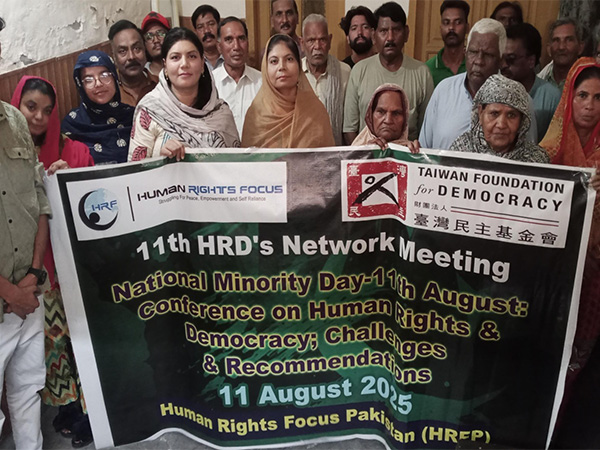HRFP and TFD Champion Minority Rights in Pakistan on National Minority Day
Human Rights Focus Pakistan and Taiwan Foundation for Democracy marked National Minority Day by highlighting challenges faced by religious minorities in Pakistan. The event emphasized Muhammad Ali Jinnah's inclusive vision for Pakistan. Discussions advocated for legal reforms and constitutional amendments to better protect minority rights and ensure democratic freedoms.

- Country:
- Pakistan
Human Rights Focus Pakistan (HRFP), in collaboration with the Taiwan Foundation for Democracy (TFD), hosted an impactful event at Vision Hall in Faisalabad, Pakistan, to commemorate National Minority Day. The theme was tailored around 'National Minority Day-11th August: Conference on Human Rights & Democracy; Challenges & Recommendations.' The gathering, both in-person and online, amplified the voices from various corners of the nation, spotlighting the numerous challenges faced by religious minorities in Pakistan. Attendees argued for specific reforms designed to improve religious freedom, democracy, equal rights, and justice in the region.
The discussions opened with reflections on the historic address by Pakistan's founder, Muhammad Ali Jinnah, originally delivered on August 11, 1947. The message championed an inclusive and tolerant Pakistan, where Jinnah famously stated, 'You are free; you are free to go to your temples; you are free to go to your mosques or any other place of worship in this state of Pakistan. You may belong to any religion, caste, or creed, that has nothing to do with the business of the state.' The HRFP underscored Jinnah's address as a foundational appeal for religious tolerance and equal citizenship—ideals which remain unfulfilled for many today in Pakistan. Panellists advocated for the formal inclusion of this vision within the Constitution and its reflection in governmental policies and legal frameworks.
The event was graced by a diverse mix of individuals, including political activists, civil society representatives, human rights defenders, educators, lawyers, women, youth, and community leaders, all united in the cause for equality and justice. HRFP President Naveed Walter pointed out that Jinnah's speech remains a significant declaration of religious freedom and political inclusivity in Pakistan's history. Nonetheless, he critiqued its selective use by political parties and emphasized genuine application over rhetorical usage. Walter further raised issues with the reserved seats system for minorities, noting that it often prioritizes political loyalty over authentic community representation.
Participants and speakers passionately highlighted the systemic discrimination, violence, and persecution that religious minorities face. Incidents of rising impunity were noted, with Walter elaborating, 'These recurring events illustrate a significant failure in guaranteeing justice and protection for minorities.' He called for robust, transparent measures to hold individuals accountable for false accusations under blasphemy laws, urging decisive government action against mob violence. A formal resolution was adopted during the proceedings, advocating the incorporation of Jinnah's August 11 address into the Constitution, specifically his call for the separation of religion from governance. The speakers urged for the realisation of human rights and promotion of true democratic ideals across all levels of governance to help achieve the 17 Sustainable Development Goals (SDGs) and the 2030 Agenda.
The panel, composed of notable figures like Sohail Emmanuel, James Lal, Ijaz Ghauri, John Victor, Sadaf Shadman, Nida Naeem, Saleem Anwar, and Bushra Bibi, stressed the urgent need for legal reforms to protect minority rights and democracy. They emphasized the importance of unity among minority groups, condemning their ongoing marginalization. The HRFP ended the event by strongly urging government and political leaders to uphold constitutional protections for all, eradicate religiously motivated violence, and ensure equal justice for citizens regardless of their faiths.
(With inputs from agencies.)
ALSO READ
Justice or Intimidation? Verdicts Stir Controversy in Pakistan
Unveiling Pakistan's Surveillance Web: A Global Technology Nexus Exposed
India Repatriates 67 Pakistan Nationals, Seeks Safe Return of Indians
India's Diplomatic Move: Repatriation of Pakistani Nationals
India's Aggressive Strategy in Asia Cup Against Pakistan










